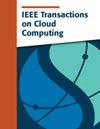Minimizing Response Delay in UAV-Assisted Mobile Edge Computing by Joint UAV Deployment and Computation Offloading
IF 5
2区 计算机科学
Q1 COMPUTER SCIENCE, INFORMATION SYSTEMS
引用次数: 0
Abstract
As a promising technique for offloading computation tasks from mobile devices, Unmanned Aerial Vehicle (UAV)-assisted Mobile Edge Computing (MEC) utilizes UAVs as computational resources. A popular method for enhancing the quality of service (QoS) of UAV-assisted MEC systems is to jointly optimize UAV deployment and computation task offloading. This imposes the challenge of dynamically adjusting UAV deployment and computation offloading to accommodate the changing positions and computational requirements of mobile devices. Due to the real-time requirements of MEC computation tasks, finding an efficient joint optimization approach is imperative. This paper proposes an algorithm aimed at minimizing the average response delay in a UAV-assisted MEC system. The approach revolves around the joint optimization of UAV deployment and computation offloading through convex optimization. We break down the problem into three sub-problems: UAV deployment, Ground Device (GD) access, and computation tasks offloading, which we address using the block coordinate descent algorithm. Observing the基于联合部署和卸载的无人机辅助移动边缘计算响应延迟最小化
无人机辅助移动边缘计算(UAV -assisted mobile Edge Computing, MEC)利用无人机作为计算资源,是一种很有前途的从移动设备上卸载计算任务的技术。提高无人机辅助MEC系统服务质量的常用方法是联合优化无人机部署和计算任务卸载。这就提出了动态调整无人机部署和计算卸载以适应移动设备位置变化和计算需求的挑战。由于MEC计算任务的实时性要求,寻找一种有效的联合优化方法势在必行。本文提出了一种最小化无人机辅助MEC系统平均响应延迟的算法。该方法通过凸优化方法,围绕无人机部署和计算卸载的联合优化。我们将问题分解为三个子问题:无人机部署,地面设备(GD)访问和计算任务卸载,我们使用块坐标下降算法来解决这些子问题。观察到原问题的NP -硬度性质,我们给出了分解子问题的近最优解。仿真结果表明,与现有算法和其他先进算法相比,我们的方法可以在几秒内生成联合优化解,并减少平均响应延迟,改进幅度从4.70%到42.94%不等。
本文章由计算机程序翻译,如有差异,请以英文原文为准。
求助全文
约1分钟内获得全文
求助全文
来源期刊

IEEE Transactions on Cloud Computing
Computer Science-Software
CiteScore
9.40
自引率
6.20%
发文量
167
期刊介绍:
The IEEE Transactions on Cloud Computing (TCC) is dedicated to the multidisciplinary field of cloud computing. It is committed to the publication of articles that present innovative research ideas, application results, and case studies in cloud computing, focusing on key technical issues related to theory, algorithms, systems, applications, and performance.
 求助内容:
求助内容: 应助结果提醒方式:
应助结果提醒方式:


